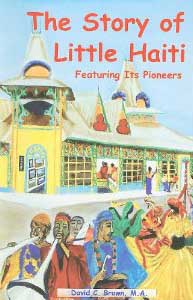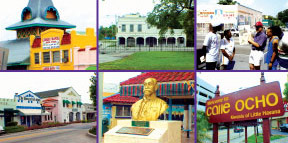Miami Cultural Tours by Author of ‘The Story of Little Haiti’
Is it possible to live in a city for nearly 40 years and yet still have so much to learn? That was the question I pondered as I left the reception for David C. Brown’s book, The Story of Little Haiti, Featuring its Pioneers. The reception at the Historical Museum of South Florida was, quite aptly, historic. Little Haiti is the largest Haitian neighborhood outside of the Caribbean island and began to evolve in the late 1950s as more and more Haitians fled their homeland. The book, a first of its kind, features brief biographies of many Haitians who came as refugees and built new lives and careers in Miami. Many of the pioneers, now elders in the community, sat next to the author and shared their stories with the audience. Each and every story told was a universe of its own.
Little Haiti’s Pioneers Mrs. Claire Nassar, known as the “mother†of Little Haiti, spoke about her awkward beginnings. She arrived in 1965 when postal workers would ask her if the envelope she was mailing had a misspelling: “Tahiti†was more familiar to Miamians at the time instead of its Caribbean neighbor to the south. Mrs. Nassar worked as a seamstress and then for a Community Mental Health program sponsored by University of Miami/Jackson Medical Center. She is a widow and has survived the death of three of her six children. Mr. St. Louis Fleurizard, who arrived in 1979, spoke of how Mr. Viter Juste, known as the “father†of Little Haiti, assisted him in settling. Later, when Fleurizard taught math and social studies at Edison Middle School, he would volunteer to help Haitian children with their homework on weekends, so they could adapt to a new environment and language. Others spoke of how they were quickly involved in the community through the Haitian American Community Association of Dade, which was the first official Haitian organization, founded in 1975. The pioneers agreed that old grudges brought into the community from the island served no purpose here. “People are fighting but we don’t know why,†said Mrs. Nassar. “We need to come together, not just Haitians, but the whole city.†Joanne Hyppolite, field researcher at the museum who organized the event, later told me that the infighting was more common among the older generation and that American-born Haitians were not interested in that aspect of the past. Overall, the sense of pride and resilience among the pioneers was palpable, mostly keenly personified in the charismatic Mrs. Nassar, who receives visitors from all over the world at her home in North Miami Place, where she has lived since 1967. As for the future of this cultural enclave, some feared it would have none. The Consulate General of Haiti stood up in the audience to add his concern. “Real estate is waiting like vultures. We need leadership to preserve Little Haiti.†Although many Haitians have moved out of the area, some still do business in their old neighborhood. As Mr. Fleurizard explained, “Many of my former students live elsewhere but have offices in Little Haiti.†Another pioneer, Mr. Jean Claude P. Cantave, looked to Little Havana, which has preserved its Cuban character in spite of the fact that Cubans are spread throughout South Florida, as an example. “Little Haiti needs a face lift. We should keep its flavor and its place names, even with new development.†With regard to place names, Ms. Marie Jose Ledan agreed. “This book is important to remind us that we once had a strong community in Lemon City. The area now known as Buena Vista was Little Haiti, but they changed the name.â€
Miami Cultural Tours Brown has done more for Little Haiti than write a book. He is the founder of Lumana Global Corporation, a company that supports community development. One of its programs, The Urban Tour Host, works on the principle of sustainable tourism, offering behind-the-scenes tours of Little Haiti, Little Havana, Overtown and Liberty City. “I was inspired by a lifelong interest in travel to unique destinations, combined with a career as a teacher, a non-profit specialist and knowing the community, its leaders and pioneers.†As an urban anthropologist, Brown’s investment in and familiarity with these communities has bolstered a tour business with over seven thousand visitors since its inception in 2000. While leviathan tourism destination Miami Beach overshadows these inner-city neighborhoods, Brown is quick to note that Miami is not all Miami Beach. His work in sustainable tourism may help revitalize these communities without effacing their historical character. “When we bring visitors to these communities, we engage locals and businesses. Visitors contribute to the economy. They also meet people—it’s informative, interactive and fun.†Although Brown has never witnessed any crime since he started operating tours, he wasn’t surprised when I told him that I would never think to visit Little Haiti because of its inner-city reputation: “I’ve even given tours to Haitians.†That astonishing fact reminded me that even as a native, I am often a tourist in my own backyard. Little Haiti’s pioneers showed me that there are lives out there and stories to be told—all we have to do is be willing to listen. In my years as a citizen of Miami, I’ve seen areas evolve with a “here today, gone tomorrow†sense of development. I often come across the statement that Miami is a cultural wasteland and although I know this stems from ignorance, people simply won’t know any better if what is left of historical Miami continues to be buried under new development. Cultural preservation and development should be friends, not enemies. Keeping a rich history alive can only bolster a community, even as that community evolves. For tour information contact David Brown at (305) 416-6868.
You Deserve More Than an Ordinary Vacation.
Travel with Miami Beach 411 Today!
The Miami Beach 411 Travel Store is Open 24/7.
1 Comments on"Miami Cultural Tours by Author of ‘The Story of Little Haiti’"
|

Like what you see? Let's talk about how
we can help your vacation --> Contact Us |
|
Like what you see? Let's talk about
how we can help your vacation
--> Contact Us
how we can help your vacation
--> Contact Us

















Corey says:
I’ve heard good things about The Story of Little Haiti. Looking forward to the next book.
Posted on 12/08/2008 at 2:53 PM